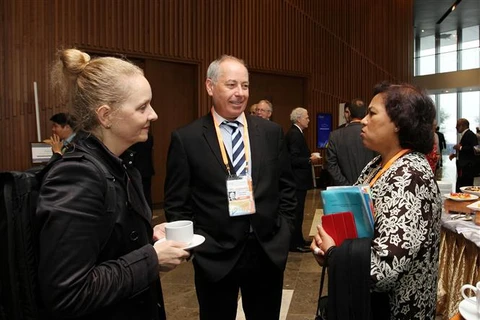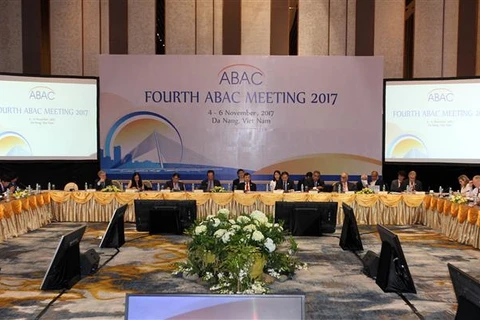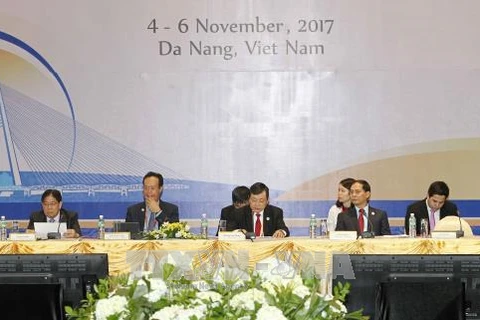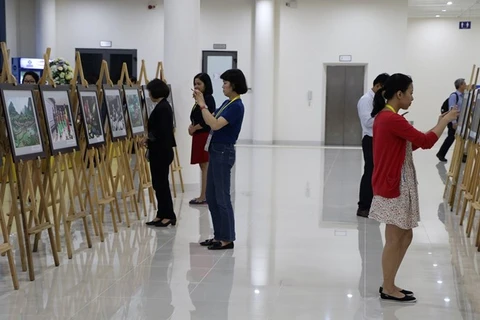Moscow (VNA) – Russia supports priorities raised by Vietnam in its capacity as the host of the APEC Year 2017, Ambassador-at-Large Valery Sorokin, a senior official of Russia for APEC.
Sorokin said these priorities match Russia’s interests, including promoting sustainable, creative and inclusive growth, enhancing regional economic integration, improving competitiveness and creativeness of micro-, small- and medium-sized enterprises (MSMEs), and stringing food security and sustainable agriculture in response to climate change.
Russia admires Vietnam’s initiative to draft a joint action programme on economic, financial and social inclusion in APEC, he said, affirming Russia’s willingness to join hands to realise the initiative.
The ambassador also stressed that Russia attaches importance to the comprehensive strategic partnership between the two countries, which is developing fruitfully across fields.
Speaking highly of Vietnam’s hosting the APEC Year 2017, he noted that as the host, Vietnam has performed a pile of work with diverse contents and wonderful organisation.
Sorokin expressed his belief that the upcoming APEC Economic Leaders’ Week from November 6-11 in central Da Nang city will be a success.
As APEC economies, Russia and Vietnam will continue their close coordination to contribute to promote the forum and step up their bilateral ties, he said, adding within the framework of APEC, Russia and Vietnam have effectively coordinated with each other since both nations joined the forum in 1998.
The official said the APEC Economic Leaders’ Meeting is an opportunity for leaders of the two countries to discuss effective solutions to elevate the bilateral relationship to a new level.
Established in 1989, the Asia-Pacific Economic Cooperation (APEC) forum comprises 21 economies, including Australia, Brunei, Canada, Chile, China, Hong Kong-China, Indonesia, Japan, the Republic of Korea, Malaysia, Mexico, New Zealand, Papua New Guinea, Peru, the Philippines, Russia, Singapore, Chinese Taipei, Thailand, the US, and Vietnam.
APEC represents about 39 percent of the world’s population and contributes 57 percent to global GDP and 49 percent of international trade.-VNA
Sorokin said these priorities match Russia’s interests, including promoting sustainable, creative and inclusive growth, enhancing regional economic integration, improving competitiveness and creativeness of micro-, small- and medium-sized enterprises (MSMEs), and stringing food security and sustainable agriculture in response to climate change.
Russia admires Vietnam’s initiative to draft a joint action programme on economic, financial and social inclusion in APEC, he said, affirming Russia’s willingness to join hands to realise the initiative.
The ambassador also stressed that Russia attaches importance to the comprehensive strategic partnership between the two countries, which is developing fruitfully across fields.
Speaking highly of Vietnam’s hosting the APEC Year 2017, he noted that as the host, Vietnam has performed a pile of work with diverse contents and wonderful organisation.
Sorokin expressed his belief that the upcoming APEC Economic Leaders’ Week from November 6-11 in central Da Nang city will be a success.
As APEC economies, Russia and Vietnam will continue their close coordination to contribute to promote the forum and step up their bilateral ties, he said, adding within the framework of APEC, Russia and Vietnam have effectively coordinated with each other since both nations joined the forum in 1998.
The official said the APEC Economic Leaders’ Meeting is an opportunity for leaders of the two countries to discuss effective solutions to elevate the bilateral relationship to a new level.
Established in 1989, the Asia-Pacific Economic Cooperation (APEC) forum comprises 21 economies, including Australia, Brunei, Canada, Chile, China, Hong Kong-China, Indonesia, Japan, the Republic of Korea, Malaysia, Mexico, New Zealand, Papua New Guinea, Peru, the Philippines, Russia, Singapore, Chinese Taipei, Thailand, the US, and Vietnam.
APEC represents about 39 percent of the world’s population and contributes 57 percent to global GDP and 49 percent of international trade.-VNA
VNA
























